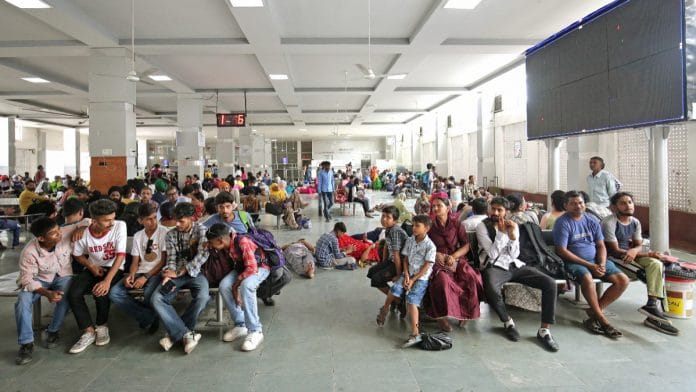New Delhi: PNR enquiries, train schedules, cab bookings and OTT services — all in one place. The Indian Railways Monday launched a mobile application that will serve as a one-stop shop for users, besides providing space for e-commerce companies to advertise their products and services.
RailTel Corporation of India Ltd, a wholly-owned subsidiary of the Indian Railways, along with a consortium of three tech companies, launched the PIPOnet mobile app Monday. The app will eventually be integrated with the Railways’ WiFi monetisation project to attract more advertisers.
Announced in January, the WiFi monetisation project is aimed at generating a revenue of Rs 250 crore through advertisers and helping RailTel monetise its assets — 1.7 million unique users of its public WiFi service available at more than 6,108 railway stations across the country.
The ‘NuRe Bharat Network’, a joint venture between RailTel, Mumbai-based 3i Infotech Ltd, Chennai-based FISST and Yellow inc, aims to provide Railways with the opportunity to host static, video, banner and other forms of advertisements to fill the ‘white sections’ on the landing page of its public WiFi network, RailWire.
With the introduction of PIPOnet mobile app, which will be available on Google Play within the next two weeks, the plan is to integrate RailTel’s WiFi users with the app and provide space for e-commerce companies to advertise their products/services, allowing for an estimated revenue of about Rs 1,000 crore, according to NuRe Bharat Network CEO Sax Krishna.
Manoj Tandon, RailTel’s director of projects (operation and maintenance), told ThePrint that the mobile app will not just give users access to “all railway services at one place” but also provide curated content. “There are already lakhs of people logging into the internet (RailWire) services regularly. It will take time, but we hope they also become regular users of the mobile app, which will be a relief in the digital deluge,” he said.
Also Read: Munching on pyaz kachori, sipping honey-sweetened tea — Indian train journeys now more flavourful
How WiFi monetisation will work
RailTel chairman and MD Sanjay Kumar said they have been searching for a strategic partner to monetise their WiFi network for some time now. According to the Railways, RailWire is the world’s largest WiFi network under a single service set identifier (SSID) or network name.
RailWire’s journey began in 2015-16, when just a few railway stations were providing free WiFi that was accessed by commuters and those living in the vicinity. Over the years, coverage was expanded and RailWire — according to RailTel officials — penetrated India’s ‘digital divide’.
Its financial model was an incremental one, wherein WiFi services were provided free of charge for the first 30 minutes, after which users were asked to pay a small amount to continue using the service. Tandon said the amount is one-fourth the cost of mobile data (Rs 1.7 per GB) and a token amount of Rs 10 allows utilisation of high-speed and secure Wi\Fi for the entire day.
During the launch of the mobile app, Kumar said there was a dip in the number of paid WiFi users during the Covid-19 pandemic, which prompted the need for alternative revenue streams. Monetisation through advertisements was finally started with the ‘NuRe Bharat Network (New Ray of India)’.
“Now, we are trying to convert those WiFi users to consumers of mobile applications by allowing them more free WiFi (four hours at 5 mbps) usage through the app and describing numerous other features the app will offer on the WiFi portal,” Krishna said. “Right now, the app will have Hindi and English but eight other major languages will be used later to meet vernacular demands and provide more regional content.”
E-ticketing, hotel reservations
In its current form, the PIPOnet mobile app will allow users to make PNR enquiries, check train schedules, make cab bookings, and access streaming services. A roadmap has also been proposed to further integrate other services like e-ticketing, hotel reservations and porter booking.
Space will also be offered to e-commerce companies, local artisans and craftsmen to promote their products on the app.
Krishna further explained that demographic information such as age and geographical location, along with user preferences, will help attract advertisers who wish to focus on this largely untapped market comprising a diverse range of residents of India’s Tier-1, Tier-2, Tier-3 and Tier-4 cities.
“There will be no violation of privacy as information of users shared would be limited to geographical and demographic data and we will be collecting feedback,” said Krishna. “So, if users are not happy with certain types of ads, those advertisers will be dropped because our first interest is serving the consumers,” he added.
While RailTel and the consortium have decided on a revenue-sharing model, sole rights of ‘NuRe Bharat Network’ rest with 3i Infotech Ltd, which would in turn share 40 per cent of its revenue with RailTel and determine if it wants to expand the partnership at the end of a five-year contract, said Tandon.
Note: An earlier version of this report said public WiFi services are offered at 618 railway stations. The report has been updated to reflect the correct figure. The error is regretted.
(Edited by Amrtansh Arora)
Also Read: Why can’t Railways make money despite plenty of aid? Parliament panel flags ‘deficiencies’






